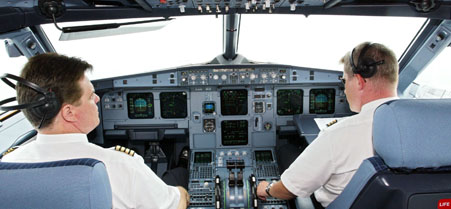FAA urges airlines to be clear on personal tech use in cockpit
Crew members are required to refrain from 'performing nonessential duties' during takeoffs and landings, but new notice asks carriers to set policies for the use of cell phones, laptops and other devices during flights.
 042610faaNGins
(Apr. 26) -
The FAA says it is currently investigating issues such as cockpit distractions.
042610faaNGins
(Apr. 26) -
The FAA says it is currently investigating issues such as cockpit distractions.
Like texting while driving, using cell phones and laptops while flying a plane is distracting and the Federal Aviation Administration on Monday urged airliners to set clear guidelines for flight crews for when it is appropriate to use personal electronic devices.
FAA issued a notice to airline operators emphasizing that while technology is increasingly common and useful on the flight deck, cell phones, laptop computers and electronic flight bags, a system that displays aviation data and information, can distract crew members from operations.
The notice comes six months after two Northwest Airlines pilots overflew their destination by more than 100 miles while using their personal laptops. A National Transportation Safety Board investigation found that the computers blocked the pilots' direct sight of cockpit controls, distracted them from operational procedures and caused them to lose situational awareness. Airline policies in place at the time prohibited the use of portable electronic devices on the flight deck, the report said.
"There is no room for distraction when your job is to get people safely to their destinations," said Transportation Secretary Ray LaHood in a statement. "The traveling public expects professional pilots to focus on flying and on safety at all times."
Regulations require pilots to give their full attention to operating aircraft. The so-called sterile cockpit rule enacted in 1981 prohibits them from performing nonessential duties during critical phases of flight, including taxiing, takeoffs and landings. The new guidance looks to extend that rule by asking air carriers to create a "culture of safety," FAA noted.
"The intention is that any use of any equipment that distracts the flight crew from the operation of the aircraft is what we're trying to address," said Les Dorr, an FAA spokesman. "It really goes beyond any electronic devices to include anything that would detract from the flight."
FAA has long been concerned with human factors and currently has a work group investigating issues such as cockpit distractions, he said. The Northwest flight isn't the only example they have to consider, Dorr added.
David Castelveter, a spokesman for the Air Transport Association, said ATA agrees with revising the sterile cockpit enforcement processes and procedures. "We have been working on better ways to reduce cockpit distractions," he said.
"You want a culture of safety, and really aviation does have a culture of safety," said Chris Dancy, spokesman for the nonprofit Aircraft Owners and Pilots Association. "But this serves to reiterate the importance to all pilots whether they are flying in a crew environment or a charter operator or a private citizen flying their own airplane."
FAA also announced on Monday the rollout of its Automatic Dependent Surveillance-Broadcast system in Philadelphia. The system relies on GPS to transmit a plane's location to towers on the ground and to other aircraft to provide more precise flight information to controllers than current technology. ADS-B is a key part of NextGen , the agency's program to overhaul the current air traffic control system, and is expected to be available nationwide by 2013.
NEXT STORY: Brother Enemy





